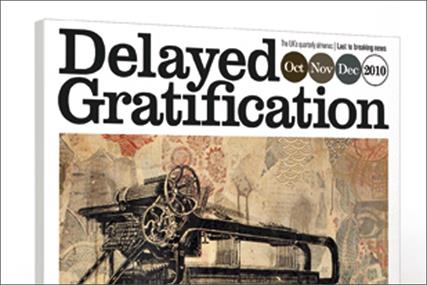The Slow Food movement started in 1986 as a response to the growth of fast food. The planned opening of a branch of MacDonalds near the Spanish Steps in Rome was a step too far for its founder, Carlo Petrini. To paraphrase their point of view: good food requires good ingredients, skill in preparation, and it takes time. In their view all that fast food has going for it is the speed with which it's delivered. Since then the concept has expanded into a wider Slow Movement covering such areas as Slow Parenting, Slow Gardening and so on. We can now add Slow Journalism to the list.
Delayed Gratification sounds like some sort of sexual practice, but in fact it's the UK's newest magazine, retailing at a princely £12 per issue. It's published by the Slow Journalism Company, and just as the Slow Food movement was a response to the growth in fast food, its remit is to act as 'an antidote to throwaway media' and it seeks to make a 'virtue of being the last to breaking news'. Founded by Marcus Webb, Time Out's International Editor, it is run from Time Out's London offices.

 |
| The cover of the first edition of DG |
The other underlying principle behind Delayed Gratification, DG to its friends, is that print isn't dead. They hope that readers like to possess, touch, and feel their magazine, so its design and production values are outstanding - the hope is that there's still a market for high quality printed material. This isn't a mag that you will find in your local newsagents, it's available from the DG website, in independent bookshops, and in luxury hotels and on airlines - presumably not in economy!
Its aim is to take the main news stories from the previous three months and subject them to review and analysis; as Webb says, "Our idea is to play up to print strength – we're not anti-internet but we wanted to create something pretty which readers would enjoy consuming slowly. We wanted to let writers return to stories with a bit of hindsight."
It's a fascinating idea, and you have to hope that it will succeed - a review of the first edition of DG will follow in due course.

No comments:
Post a Comment